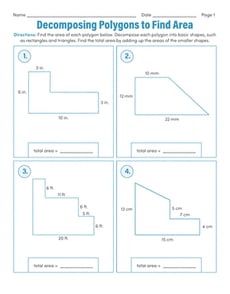6th Grade Classifying Two-Dimensional Shapes Worksheets
About 6th Grade Classifying Two-dimensional Shapes Worksheets
On Education.com, parents and teachers can access a variety of resources and worksheets designed to help 6th grade students understand and classify two-dimensional shapes. These materials include printable worksheets, interactive activities, and visual guides that teach students to identify shapes such as triangles, quadrilaterals, circles, and polygons. By providing hands-on practice, these resources support geometry instruction and enhance students' ability to analyze shapes' sides, angles, and symmetry.
This page offers educational worksheets that challenge students to distinguish between different types of two-dimensional shapes, understand their properties, and apply geometric principles. Each worksheet includes exercises on identifying shapes, grouping similar figures, and recognizing angles and side lengths. These resources help make learning geometry engaging and accessible for 6th graders, reinforcing classroom lessons and encouraging independent exploration.
Using these worksheets at home or in the classroom provides a structured and efficient way to strengthen students' shape recognition skills. Educators and parents can use the printable materials to guide discussions, assess understanding, and provide targeted support. With a range of exercises from beginner to more advanced, these resources make geometry practice accessible and enjoyable for 6th grade learners.
This page offers educational worksheets that challenge students to distinguish between different types of two-dimensional shapes, understand their properties, and apply geometric principles. Each worksheet includes exercises on identifying shapes, grouping similar figures, and recognizing angles and side lengths. These resources help make learning geometry engaging and accessible for 6th graders, reinforcing classroom lessons and encouraging independent exploration.
Using these worksheets at home or in the classroom provides a structured and efficient way to strengthen students' shape recognition skills. Educators and parents can use the printable materials to guide discussions, assess understanding, and provide targeted support. With a range of exercises from beginner to more advanced, these resources make geometry practice accessible and enjoyable for 6th grade learners.



